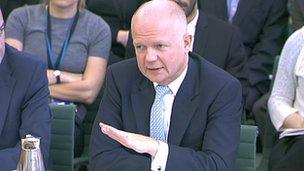William Hague: Nato's Afghan move not strategy change
- Published

William Hague told MPs it was usual for military leaders, rather than politicians, to make decisions
Foreign Secretary William Hague has insisted Nato's decision to scale down joint patrols with Afghan forces will have a "minimal" impact on UK strategy.
Two British soldiers were killed at the weekend, in one of a series of attacks by "rogue" Afghan troops.
On Monday the government said such actions would not "derail" operations, leading to questions over when it was told about Nato's decision.
But Mr Hague told MPs there had not "been any change in strategy on this".
A fifth of UK soldiers killed in the country this year have been victims not of insurgents, but of Afghan soldiers or police. Such incidents, known as "green-on-blue" attacks, have increased concern over safety.
Sergeant Gareth Thursby and Private Thomas Wroe, both of 3rd Battalion, The Yorkshire Regiment, were shot dead on Saturday by a rogue Afghan soldier who turned on them after faking injury.
'Quite clear'
In the Commons on Monday, Defence Secretary Philip Hammond said: "We cannot and will not allow the strategy to be derailed... the pain felt is all the more raw when the incident undermines the trust that our armed forces have built in Afghanistan."
Nato has since announced that joint operations carried out by its own International Security Assistance Force (ISAF) and Afghan troops will be restricted. They will only routinely happen at battalion level or above, with smaller patrols being signed off on a case-by-case basis.
But the BBC has learned that the policy shift became "effective" on Sunday.
World affairs editor John Simpson said there were "signs of panic" on the part of the United States, which had led to Nato changing its mind before there was time to inform the UK or Afghan governments.
He added that he had overheard Mr Hammond, on a recent visit to Afghanistan, saying that "the whole question of insider killings was threatening the strategy of ISAF".
Following an urgent question from Conservative MP John Baron, Mr Hammond delivered a second statement to the Commons on Tuesday, saying ISAF had taken a "prudent but temporary measure" regarding troops' safety
He added: "The security of our deployed forces in Afghanistan, or anywhere in the world, remains a defence priority. The safety of our service personnel is one that all in government and the military chain of command take extremely seriously."
In lively Commons scenes, Labour MP Paul Flynn, a prominent opponent of the war, was suspended for refusing to withdraw accusations that the coalition had lied about its Afghanistan policy. Mr Hammond dismissed the remarks as "scandalous".
'Biggest ally'
Mr Hague played down the significance of Nato's decision when questioned by the Commons Foreign Affairs Select Committee, saying: "There hasn't been any change in strategy on this."
He added: "The decisions are for military leaders, properly for commanders, so it's entirely for them to make these decisions and not to be second guessed by a defence or foreign minister."
But Labour MP MacShane, who is demanding that UK forces leave Afghanistan by Christmas, said: "In essence the Americans are saying: 'It's over. It's drawdown time and pretty soon we'll be out like we got out of Vietnam, like we got out of other colonial wars.'
"Yesterday I did ask an urgent question of Mr Hammond. He came to the Commons about these deaths and he didn't mention this at all.
"Either he knew about it and was hiding it, which I don't think is the case, or frankly the Americans aren't even bothering to tell their biggest ally."
One of the main justifications for troops being in Afghanistan is the training of Afghan security forces to handle the situation once UK forces withdraw in 2014.
Conservative MP Bob Stewart backed calls to "get our troops out as fast as possible" but added: "It's not easy to just pull up stumps."